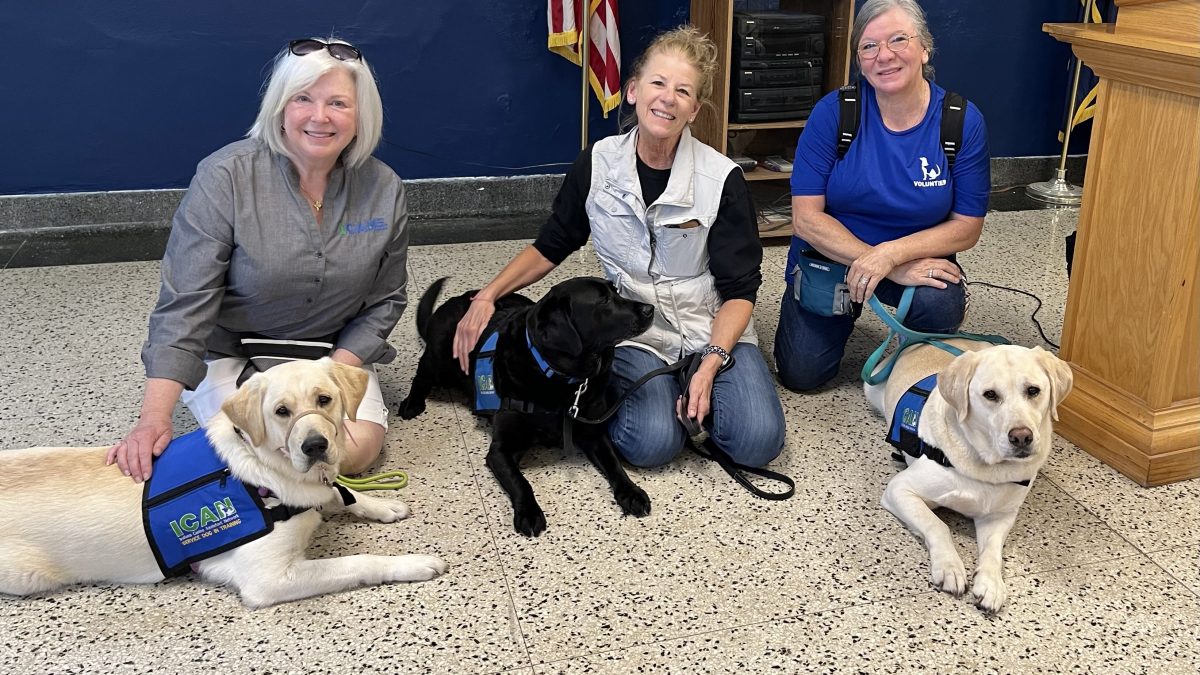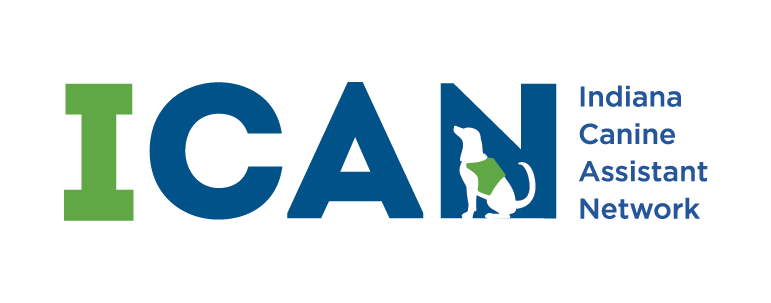What to Expect When You Apply for a Service Dog

Nearly 40 million Americans live with a disability that significantly impacts their daily life. Many of them could benefit from a service dog, but they’re not sure how to navigate the application and training process.
We know that others’ independence, safety, and stability depend on having the right information to weigh their options before deciding to commit to a dog. In this post, you’ll learn what to expect when you apply for a service dog from ICAN. We’ve included questions we often get from applicants, as well as additional resources to guide you.
First, decide what kind of service dog best fits your needs and lifestyle. Depending on your condition and needs, one type of dog might be better for you than another. Our service dogs include:
- Mobility Assistance Dogs
- Veteran Assistance Dogs
- Diabetic Alert Dogs
- Facility Dogs
- Autism Assistance Dogs
- In-Home Skilled Companion Dogs
Next, complete the appropriate application and ask your medical and personal references (if required) to complete their part of the application. Then, send us your application and references, along with your $75 non-refundable application fee. PLEASE NOTE: Applicants must reside in Indiana, complete the entire form, and submit the application fee.
Here are the links to our application forms:
Please mail your completed application and $75 application fee to:
ICAN
Attention: Director of Client Success
5100 Charles Court, Suite 100
Zionsville, IN 46077
Once your application for a service dog is complete, we will contact you to either come to the office for an interview or schedule an in-home interview. These meetings will help us determine if we can give you a dog that meets your needs — and if you can provide a safe, healthy home for him or her.
We’ll ask you questions such as:
- What are your needs and challenges? What kind of help do you need?
- How do you see a dog helping you with your daily activities?
- Who will take care of the dog in the event that you (or the primary handler) cannot?
- Do you or your family have the financial means to care for a service dog?
- Are there other animals in the household or facility? If so, how might introducing a service dog affect them? Have you introduced them to other dogs before?
- Does anyone in the house or facility smoke? If so, how often?
- Are there other members of the household? If so, how do they feel about you getting a service dog? Are they supportive?
- Are you willing to continue caring for and training a dog (e.g., trimming your dog’s nails, grooming, taking them to the vet, picking up waste)?
- Is anyone in the house or facility allergic to dogs?
We’ll also ask your permission to videotape the interview so we can get a sense of your capabilities and living situation. In addition, the videotape lets us revisit your needs as we evaluate possible canine matches. Finally, we’ll have a rescue dog with us during the interview to see how you or your child interact with the animal.
The wait time from application to being matched with a dog depends on several factors:
- While we accept applications from adults with disabilities, please note that our placement priority is for children and adolescents.
- We review and evaluate applications in the order in which we receive them. But because we strive to make the best possible placement, time frames will vary.
- To make smart and appropriate matches, we must evaluate and compare the structure, temperament, motivations, and strengths of the dog with the lifestyle, personality, and assistance needs of the recipient.
As soon as we’ve approved your application, we’ll start working on finding a dog to fit your needs. The average applicant can wait anywhere from one to three years; those who apply for an autism assistance dog might wait three to five years. Please remember this is only an estimate, and the wait time is based on the needs of the client and the availability of the right dog to fit these needs.
Many of our applicants qualify, but not everyone does. We take various factors into consideration when deciding whether or not an ICAN dog is right for you. While we may approve you to be on our waitlist, this does not guarantee the placement of a dog.
Please know that even if you don’t qualify for an ICAN service dog, we’ll still guide you to the organization that’s right for you. For example, you may be eligible for a therapy dog, emotional support dog, or psychiatric assistance dog. In this case, we’ll direct you to Assistance Dogs International, which provides various types of assistance dogs.
Once we choose a dog that may be a great match for you, we’ll either arrange a home visit or invite you to our office for a practice session. During the practice session, you’ll get an idea of what working with a service dog will be like. We’ll help you run through cues, practice keeping the dog safe while outside, and more.
Once we’ve found the best dog for you, we’ll ask you to attend two weeks (10 days) of Team Training, where you and your new partner will learn to work together. Please note that we require complete payment of the one-time $2,500 placement fee by the first day of Team Training. We also highly recommend that you get pet insurance for your service dog.
Team Training is a 10-day program that prepares clients like you once we’ve matched them with the best service dog to meet their needs. The program takes place at the Indiana Women’s Prison (IWP) in Indianapolis; your teachers will include ICAN staff and carefully selected inmate handlers who’ve been training our service dogs for six to eight months.
For the next 10 days, you’ll participate in group training, one-on-one sessions, and fun games. Your dog’s handler will show you how to properly care for your pup, teach you cues to “speak dog,” and problem-solve for the many ways the dog will improve your daily life. Our handlers will also team up to provide different scenarios, so you get multiple opportunities to practice working with your new dog.
During Week 2 of Team Training, you’ll attend “field trips” to restaurants, grocery stores, malls, and parks with ICAN staff and volunteers. These outings will help you practice handling your service dog and giving them cues in public. It’s also a fun experience to continue bonding with your new dog!
A couple of notes:
- The prison’s culinary program will prepare lunches for clients, and you can enjoy snacks and beverages each day.
- Entering a prison for the first time can be intimidating, so our staff and handlers strive to make you feel safe and comfortable throughout your training.
Once you complete Team Training, you’ll participate in ICAN Graduation. We hold these ceremonies at the Indiana Women’s Prison (IWP) on the second Thursday of June and December. Graduation is a celebration where both handlers and clients come together one last time before you get to take your service dog to their forever home.
During ICAN Graduation, your dog’s handler will introduce you and place the official service dog vest on your new friend, then hand the dog over to you. Handlers will also have the chance to share with guests how being in our program has made an impact on their lives. It’s an emotional yet inspirational evening as we celebrate how our service dogs help clients and handlers feel more empowered, break barriers, and overcome challenges — generating life-changing results.
We’ll have regular follow-ups for several months after you bring your dog home. And our team is dedicated to supporting you even after you bring an ICAN dog home. We’ll have regular check-ins for the life of our partnership (8-10 years) at no additional cost. This will ensure that you and your service dog continue to be a safe, effective team together.
It’s important to keep up your dog’s training — and to be patient with them when they make mistakes. That’s because it takes two years of intense training for a puppy to become a service dog. And they don’t look at their placement as work; instead, they thrive on problem-solving and staying mentally and physically active. By working with your service dog every day, you’ll be able to keep them sharp, healthy, and happy.
Bringing a service dog into your home or facility is hard but rewarding work. Not only do you have to look out for yourself, but now you’re also responsible for another living being’s health and safety.
Your whole life will change — and for the better. If you’re willing and able to provide for a service dog, keep up their training, and love on them, you might be a great fit for ICAN!
When you bring a service dog home, you’ll find purpose, independence, stability — and a new best friend.
Nearly 40 million Americans live with a disability that significantly impacts their daily life. Many of them could benefit from a service dog, but they’re not sure how to navigate the application and training process.
We know that others’ independence, safety, and stability depend on having the right information to weigh their options before deciding to commit to a dog. In this post, you’ll learn what to expect when you apply for a service dog from ICAN. We’ve included questions we often get from applicants, as well as additional resources to guide you.
